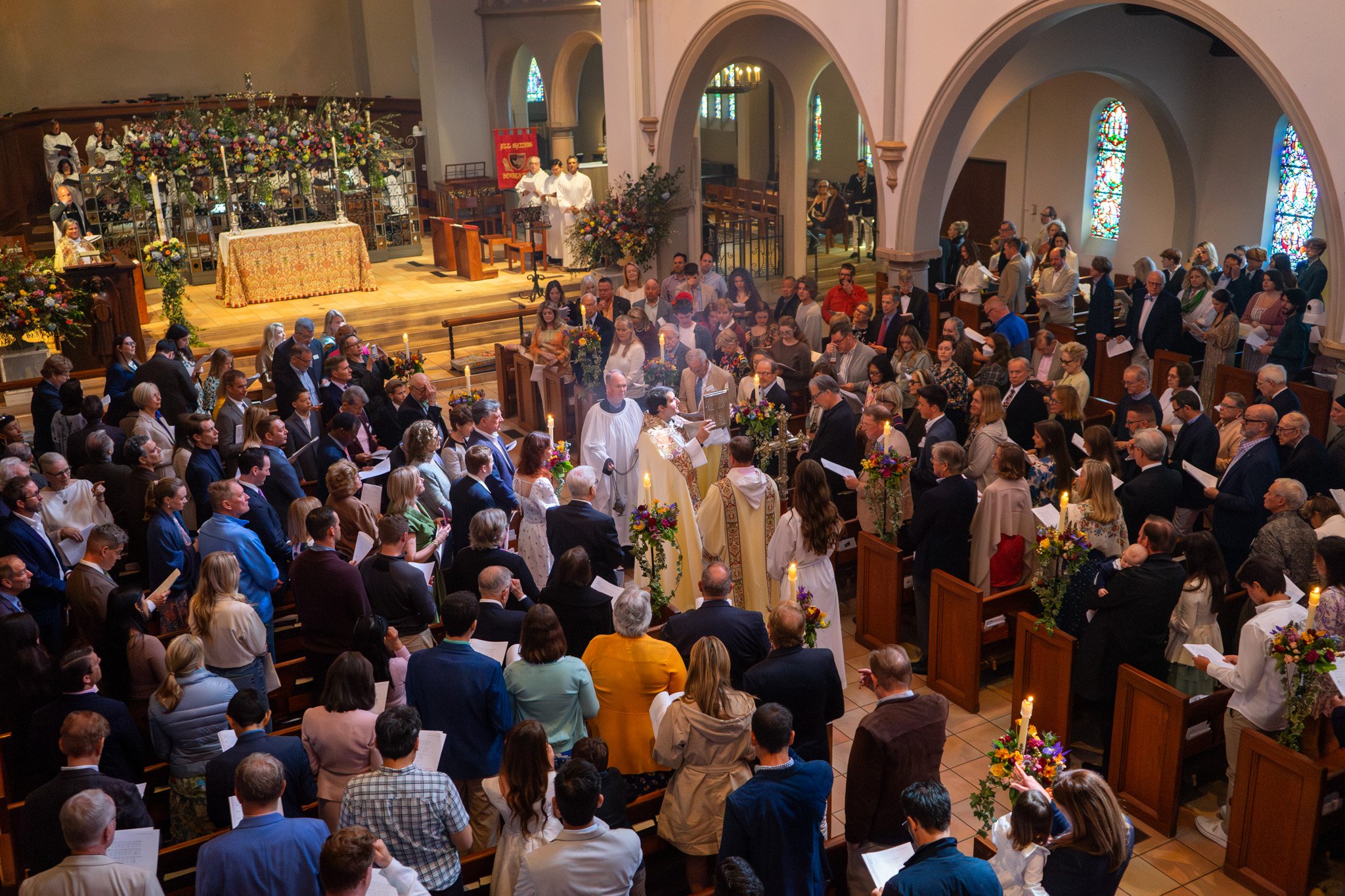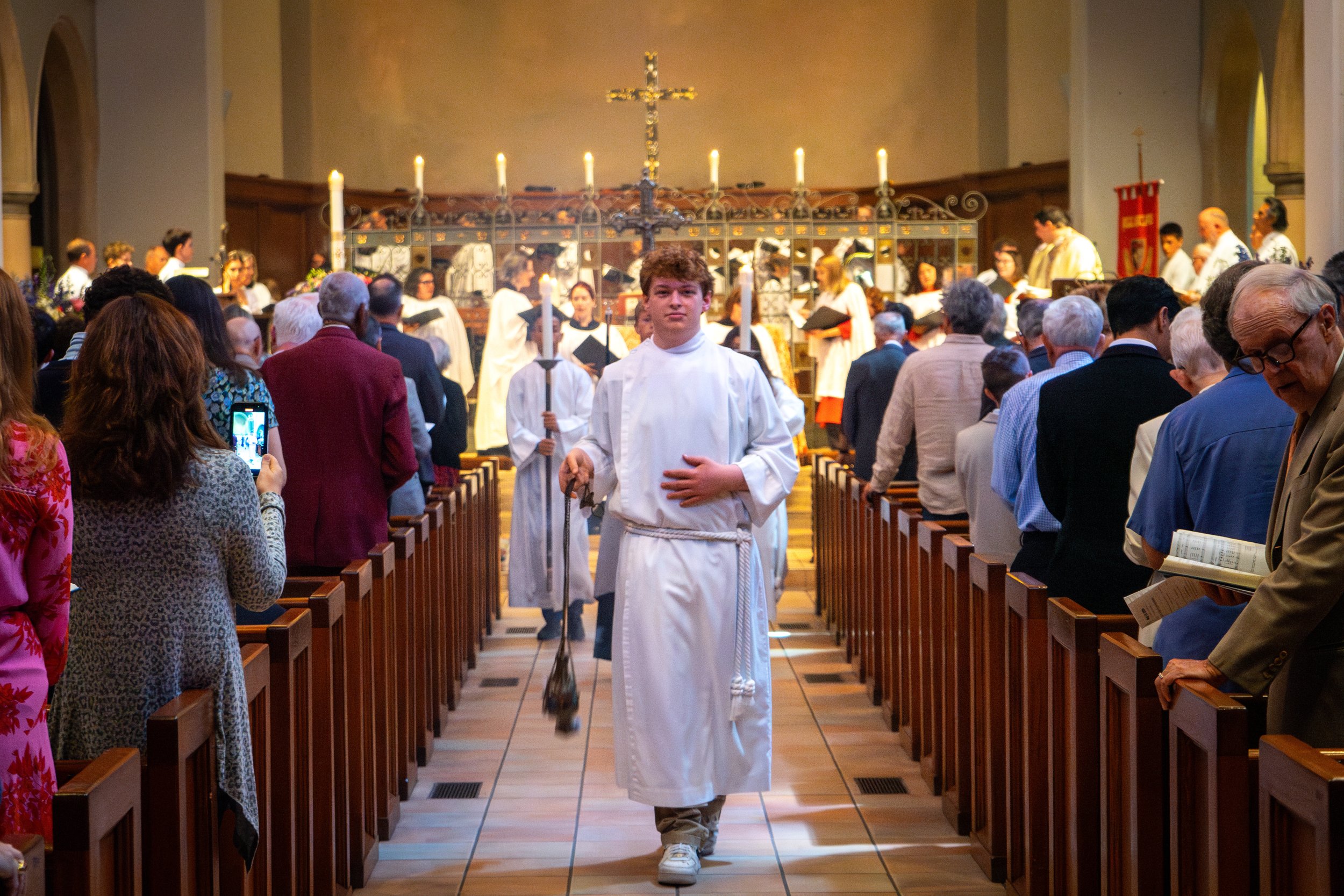
Learn the Lingo
It can be easy to feel like the Episcopal Church has a language all its own. And in a way, it kind of does!
Below, you’ll find a definition of some of our most commonly-used terms.
Glossary
-
A general term to describe youth members of the church who help with essential services — servers, torchbearers, lighters of candles, crucifers, thurifers, banner-bearers, etc.
Learn more about acolytes and the worhip ministry at All Saints’ here!
-
The first season of the church year, beginning with the fourth Sunday before Christmas and continuing through the day before Christmas. The name comes from the Latin word for “coming.” The season is a time of preparation and expectation for the coming celebration of our Lord’s nativity, and for the final coming of Christ “in power and glory.”
-
A service held during the pre-Christmas Advent season, in which the reading of the scriptural history of salvation from the creation to the coming of Christ is interspersed with the singing of the great music of the season, including but not limited to carols.
A traditional form of service is included in the Book of Occasional Services (BOS). The most popular forms of service are those based loosely on that used on Christmas Eve at King’s College, Cambridge.
-
A day commemorating all saints, known and unknown, on November 1st. All Saints’ Day is one of the seven principal feasts of the church year, and one of the four days recommended for the administration of baptism. All Saints’ Day may also be celebrated on the Sunday following November 1st.
-
The official book of worship of the Episcopal Church. The BCP provides liturgical forms, prayers, and instructions so that all members and orders of the Episcopal Church may appropriately share in common worship. Anglican liturgical piety has been rooted in the Prayer Book tradition since the publication of the first English Prayer Book in 1549.
The BCP includes the calendar of the church year, and it provides forms for the Daily Office, the Great Litany, the Collects, Proper Liturgies for Special Days, Holy Baptism, the Holy Eucharist, Pastoral Office, and Episcopal Services.
-
A collection of offices for specific purposes and occasions “which occur in the work of Bishops and other Clergy.”
-
A non-metrical song used in liturgical worship. Canticles are drawn from biblical texts other than the Psalter. The term is derived from the Latin canticulum, a “little song.” In practice, canticles are sung or said in worship.
-
A prayer meant to gather the intentions of the people and the focus of worship into a succinct prayer.
-
The last of the four services in the Daily Office (BCP, p. 127). It is descended from the night prayers said before bed at the end of the monastic round of daily prayer.
Compline is a simple office, including a confession of sins, one or more psalms, a short reading from scripture, versicles and responses, the Lord’s Prayer, collects which ask for God’s protection during the night to come, and the canticle Nunc dimittis. A hymn for the evening may follow the short reading from scripture. The collects may be followed by a time of silence, along with free intercessions and thanksgivings.
-
Use of daily prayers to mark the times of the day and to express the traditions of the praying community is traditional in Judaism and Christianity.
Participation in the Daily Office is at the heart of Anglican spirituality. It is the proper form of daily public worship in the church.
-
The territorial jurisdiction of a diocesan bishop. The term also refers to the congregations and church members of the diocese.
-
The sacrament of Christ’s body and blood, and the principal act of Christian worship.
The Last Supper provides the basis for the fourfold eucharistic actions of taking, blessing, breaking, and sharing. Christ’s body and blood are really present in the sacrament of the eucharist and received by faith.
Christ’s presence is also known in the gathered eucharistic community.
-
One of the principal Daily Offices. Evening Prayer has been the title for the Evening Office in Anglican worship since the 1552 revision of the Prayer Book.
-
Since the late middle ages, “evensong” has been the popular name for vespers, the Evening Office of the western church. Learn more abut our Evensong services here.
-
Early Christians observed “a season of penitence and fasting” in preparation for the Paschal feast, or Pascha. The season is now known as Lent (from an Old English word meaning “spring,” the time of lengthening days).
-
A selection of scripture that serves as a reading for a church service. It is also known as a lection or a reading.
-
The Thursday in Holy Week. It is part of the Triduum, or three holy days before Easter. Maundy Thursday celebrations commemorate the institution of the eucharist by Jesus “on the night he was betrayed.”
-
An office hymn has formed a part of the Daily Offices of western Christians since the time of St. Ambrose in the fourth century.
-
A self-supporting congregation under a rector, as opposed to a mission or other congregation under a vicar.
-
The ministry of caring at the heart of the church’s life. It may include hospital visitation, counseling, and ministries of shared presence, listening, and support.
Pastoral care can refer to the ministries of hospital chaplains, pastoral counselors and therapists, social workers, and other professionals who serve in the name of the church. It also includes parish ministries of clergy and laity who respond to human need.
-
Outward and visible signs of inward and spiritual grace, given by Christ as sure and certain means for receiving God’s grace.
Baptism and Eucharist are the two sacraments given by Christ to his church. The Episcopal Church recognizes that five other sacramental rites evolved in the church under the guidance of the Holy Spirit, including Confirmation, Ordination, Holy Matrimony, Reconciliation of a Penitent, and Unction (the anointing of the sick with oil, or the laying on of hands) (BCP, pp. 860-861).
-
The word comes from the Latin for “writings” and refers to a collection of the most important documents in a given religious community. Many different religions have scriptures.
The term “canon,” which means a rule or listing, refers to the list of items included in a scripture.
-
This form of contemporary liturgical song was first developed for use by the ecumenical Christian community at Taizé, France.
It uses repetitive structures that can easily be memorized, along with other parts for solo voices, choirs, and instruments. In recent years it has gained acceptance and is used in many denominations.







